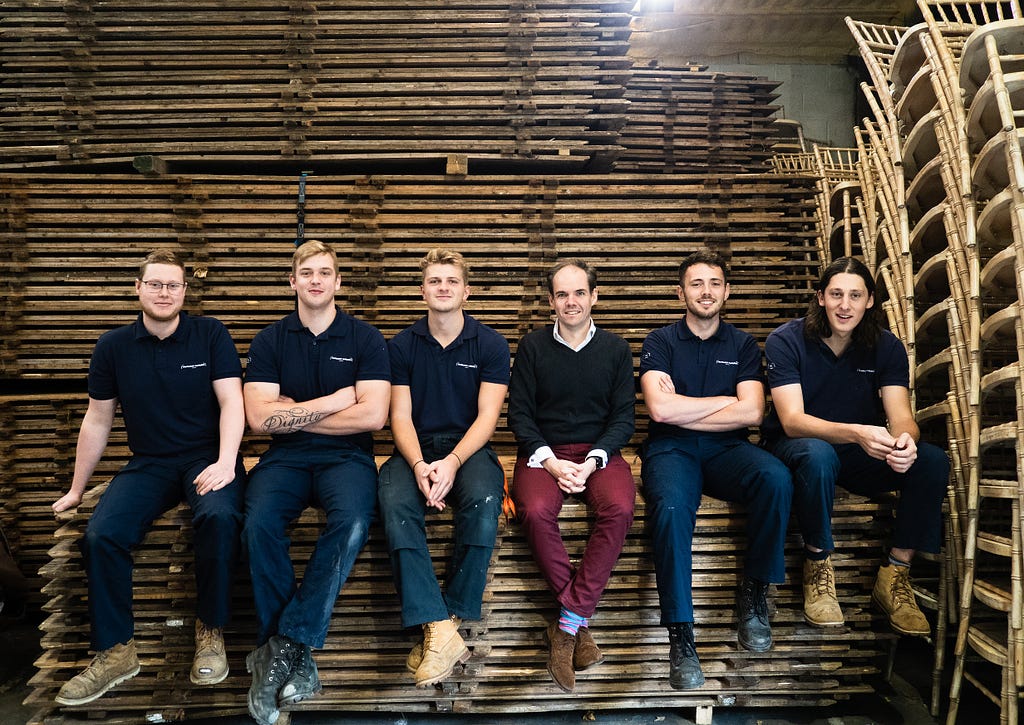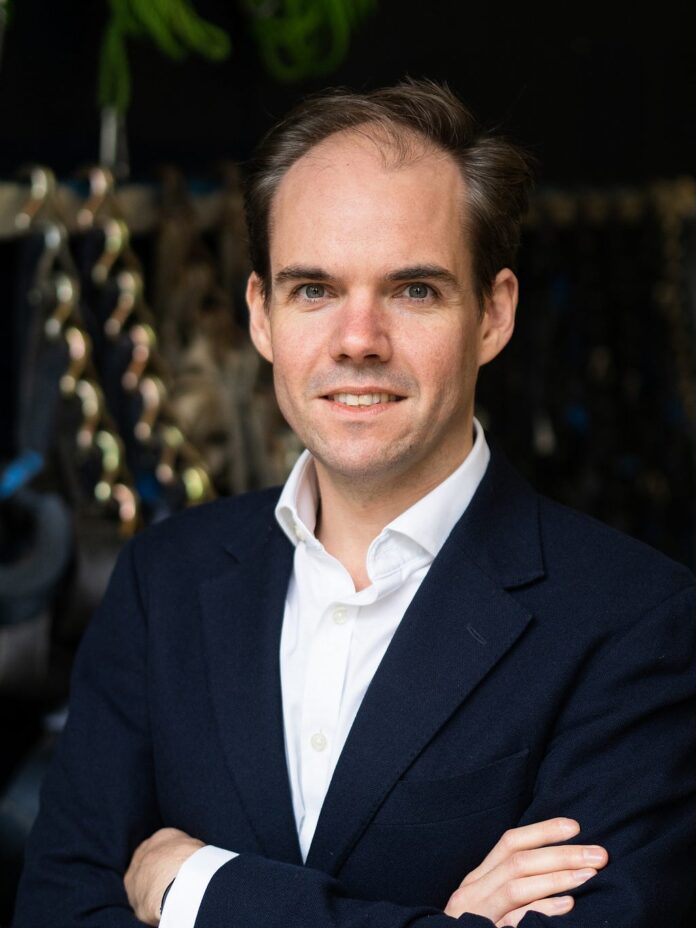James Morris Of Trafalgar Marquees: Five Strategies Our Company Is Using To Tackle Climate Change & Become More Sustainable
An Interview With Martita Mestey
You don’t have to hide away in a big corner office as your business grows. You’re still part of the team. I have never had my own office — I would find it so boring! I much prefer to be closer to the team and accessible to them.
As a part of our series about how companies are becoming more sustainable, we had the pleasure of interviewing James Morris.
Described as “One of Surrey’s most dynamic entrepreneurs”, James founded his business while studying at university. Using his student overdraft, he created a marquee hire company that has become a thriving, award-winning temporary space business servicing clients worldwide. He lives in Amsterdam.
Thank you so much for doing this with us! Can you tell us a story about what brought you to this specific career path?
While at university, I was looking for something to do in the summer holidays that would allow me to get outside, meet new people, and gain some practical skills alongside my studies. I decided to create an events business and used my student overdraft to get started. Fifteen years later, I run a thriving, award-winning temporary space business.
What is the mission of your company? What problems are you aiming to solve?
At Trafalgar Marquees, we create space. From a marquee for a corporate event to a new canteen, classroom, or warehouse area, we offer flexible, rapid deployment of high-quality, affordable temporary structures.
Need to cover a team of stonemasons while working in a highly prestigious retail and residential development in London’s Hyde Park? Temporary storage for MRI scanners in a car park in just three days, securing millions of pounds worth of vital medical equipment? Where traditional solutions wouldn’t typically work, we can help. When clients don’t have time to construct an actual building or don’t have the access or space for something like a portacabin, our bespoke solutions provide the space they need.
When South East Colleges over-recruited for their bricklaying course, we delivered temporary workshop space so students could carry on learning. When the Queen died, we were on site within 24 hours of getting the call. Two days later, 9,600 square feet of temporary space was ready for eight global media groups to report on the Queen’s State funeral. During the King’s Coronation, we provided temporary space for the BBC in a highly prestigious location not generally accessible to the public, between Westminster Abbey and the Houses of Parliament. There was such a buzz about being part of a historic, momentous international event.
Can you tell our readers about the initiatives that you or your company are taking to address climate change or sustainability? Can you give an example for each?
Our journey began in 2020. COVID was a catalyst for change that brought sustainability and wellbeing to the forefront of our organisation. Working in events is generally highly sociable and great fun. But the long, antisocial hours can take their toll on physical and mental health, which isn’t sustainable.
In partnership with a mental health charity, we designed and introduced a multi-layered wellbeing programme, including regular wellbeing workshops. We offer all employees free individual counseling and run regular wellbeing surveys. Recently, we have enhanced our employee benefits package, introducing life insurance, a health care cash plan, and an employee assistance programme.
In 2022, we took action on some of the basics of our business. We switched to LED light bulbs, banned single-use bottles after giving everyone a reusable water bottle and got our first electric vehicle pool car. In 2023, we have taken the process further, moving the company pension to a sustainable fund and committing to reducing our work with controversial industries.
After a year-long application process, we have become a Certified B Corporation™, something I am incredibly proud of. As our journey continues, we will focus on our supply chain next, delving deeper into the practices of the suppliers we choose to use. We are also investigating how to store and conserve water better and reduce the need to buy equipment or repair more.
How would you articulate how a business can become more profitable by being more sustainable and more environmentally conscious? Can you share a story or example?
We’ve got to stop thinking about the two being opposites — that somehow, being more sustainable will be less profitable. Being more sustainable makes complete economic sense. If you look at the long term, the only practical option is to become more environmentally conscious. There will be no future market if we don’t do something.
For me, sustainability and wellbeing go hand-in-hand. The case for becoming more profitable by investing in wellbeing is clear. The Deloitte Mental Health and Employers report highlights that employers see an average return of £5 for every £1 spent on improving employee mental health and wellbeing. Several factors drive this return, including reduced absenteeism, higher productivity, and reduced employee turnover.
Talent attraction and retention are incredibly challenging at the moment. Being a B Corp helps us stand out positively, demonstrating our commitment to our people and the planet. This benefits our bottom line, making us more profitable through lower recruitment costs and higher productivity.
The youth led climate strikes of September 2019 showed an impressive degree of activism and initiative by young people on behalf of climate change. This was great, and there is still plenty that needs to be done. In your opinion what are a few things parents should do to inspire the next generation to become engaged in sustainability and the environmental movement?
John F. Kennedy reportedly said, “One person can make a difference, and everyone should try”. This is a brilliant belief for parents to pass on to the next generation. Anyone can make a difference. You can start small but achieve so much.
Going through the B Corp process and living in the Netherlands has led me to question the concept of consumption. We need young people to ask themselves — do I really need this? Is there another way that is better for the environment?
Living in Amsterdam, I don’t miss the car I once relied on. Apparently, Amsterdam used to be filled with traffic. Rising fuel prices in the 1970s forced the government to rethink its approach to transport and invest in the infrastructure to make public transport or cycling an easier choice. Parents can provide the infrastructure for their children at home. Leading by example — walking or cycling if you can. Recycling as much as possible. Embedding these sustainability basics in children as they grow up will set them on a path to a more sustainable future.

What are your “5 Things I Wish Someone Told Me Before I Started” and why?
- The power of 1%. It’s easy to feel overwhelmed and under pressure — like you don’t know where to start. But you just need to start somewhere. Do just one thing. It’s all about your mindset. You can choose to make things difficult or see simple solutions and take action.
- Lead by example — set the standards you want your team to follow, whether that’s sustainability, work-life balance or any of your other values. I work in a hybrid way from the office in England and my home in Amsterdam, and I encourage my team to work flexibly, too. I’ll go out for a cycle at lunch or take the dog for a walk. It is vital to ‘walk the talk’ on mental health and work-life balance.
- It’s rewarding to empower others — seeing them thrive and achieve more than you thought possible. The King’s Coronation was a fantastic example. The team planned it far better than I would have done and demonstrated what an engaged and energetic team they are to deliver our part of such a historic event.
- You don’t have to hide away in a big corner office as your business grows. You’re still part of the team. I have never had my own office — I would find it so boring! I much prefer to be closer to the team and accessible to them.
- Share the issues. Don’t assume you or your senior managers will have all the answers. Everyone has something to bring to the table. Problem-solving together can be incredibly powerful and produce better results.
None of us are able to achieve success without some help along the way. Is there a particular person who you are grateful towards who helped get you to where you are? Can you share a story about that?
Many people have supported me on my journey. My accountant, Rebecca, and my Independent Financial Advisor, Sebastian, have been incredibly helpful.
Rebecca has inspired us along our B Corp process, making suggestions from her experience and providing the information we needed along the way. She supported us during the pandemic by providing financial wellbeing support and budgeting advice for the team.
Seb is a fellow B Corp and has been a significant help through the B Corp certification process. He assisted with moving our pension provider to a sustainable fund provider and putting in place our employee assistance benefits, including life insurance, income protection and other financial wellbeing benefits.
You are a person of great influence and doing some great things for the world! If you could inspire a movement that would bring the greatest amount of good to the greatest amount of people, what would that be? You never know what your idea can trigger. 🙂
Education is a huge enabler, so if I could inspire a movement, it would be about bringing education to all corners of the world. During my MBA, I worked on a project in South Africa, and I saw first-hand the positive impact education has on people’s lives.
Do you have a favorite life lesson quote? Can you tell us how that was relevant to you in your own life?
“You manage things, you lead people”, Rear Admiral Grace Murray Hopper. I came across this quote in the coaching and mentoring course I am currently completing. It resonated with me about the type of leader I am and my whole sustainability journey. As a leader, I firmly believe my role is to empower people and inspire them to go on their own journey. The reality is that we do lots of things that are not sustainable. But we can manage those things to make them more sustainable and inspire and lead other people to be the change the world needs.
What is the best way for our readers to continue to follow your work online?
https://www.linkedin.com/in/jamesfmorris/
This was so inspiring. Thank you so much for joining us!
James Morris Of Trafalgar Marquees: Five Strategies Our Company Is Using To Tackle Climate Change &… was originally published in Authority Magazine on Medium, where people are continuing the conversation by highlighting and responding to this story.


